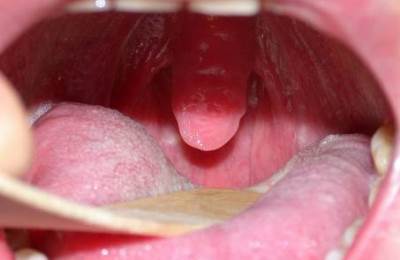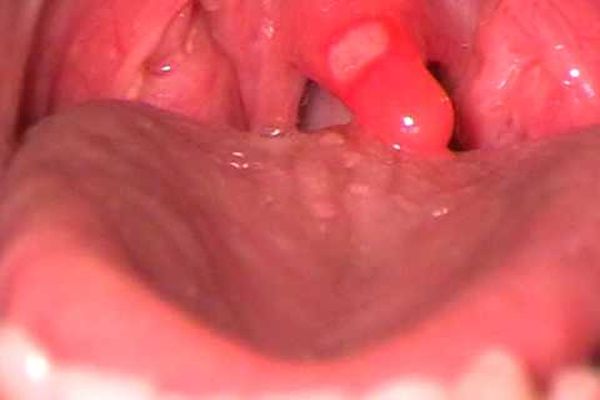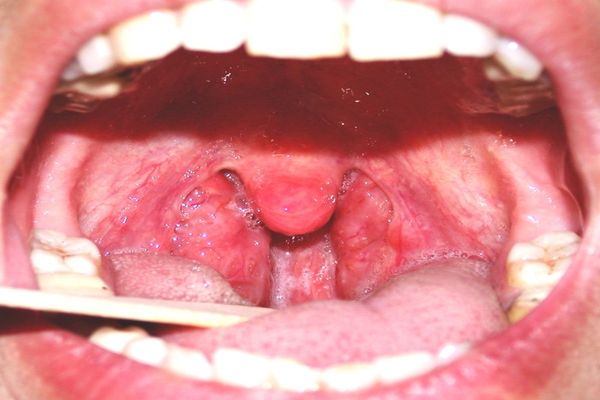Why small tongue is sharp. Why is the tongue in the throat swelling
A hard and soft palate separates the mouth and nasopharynx in the mouth. The small tongue is one of the components of the soft palate. It is responsible for the separation of food streams, prevents foreign bodies from getting inside, gag reflex, warming the air entering the mouth, preventing the spread of infectious diseases. In addition, he participates in the formation of voice, affects the pronunciation of sounds.
The uvula can become inflamed. There are a lot of reasons. This condition is called uvulit and requires immediate treatment, as it can lead to the spread of infection to other respiratory organs. People who have had adenoids or tonsils removed are particularly susceptible to this disease.
Symptoms of uvulita
In the normal state, the tongue in the throat is small and so familiar that we do not feel its presence. Inflammation may begin suddenly. Sometimes the symptoms are mild. Their manifestation can not be detected immediately.
Swelling of the uvula in the throat is recognized by the following features:
Visually, you can see that the tongue has acquired a bright red color. This is due to the fact that there are many blood vesselswhich often become inflamed. It also hangs to the root of the tongue.
Inflammation of the uvula in the throat can even lead to asphyxiation, or suffocation. Therefore, it is important to timely detect the cause of edema. Only a doctor can help you with this.
Inflammatory causes of uvulita
There are various options for why there was swelling of the uvula. This can occur in infectious diseases of the throat, due to allergic reactions, for burns, etc. Treatment should always be prescribed by a doctor after examination and testing. Inflammatory Diseases, which cause uvulitis, are the following pathologies.
For the treatment and disposal of MOKROTY our readers successfully use a natural remedy for MOKROTHA. This is 100% natural remedyThe basis of which includes only herbs, and mixed in such a way as to most effectively deal with the disease. The product will help to quickly and effectively defeat the cough in a short time, and once and for all. Since the drug consists only of herbs, it has no side effects. Does not affect pressure and heart rate. Get rid of sputum ... "
- Sore throat - inflammation of the tonsils and tonsils. This is serious streptococcal infectionin which it is important to prevent complications. The tongue is usually an obstacle to the disease, but sometimes it suffers itself. This is especially characteristic of chronic tonsillitis.
- Sinusitis - an infectious disease of the mucous membrane of the paranasal sinuses. Pathogens spread rapidly, affecting the pharynx and soft palate.
- Rhinitis. When it inflammation occurs in the nasal cavity. Because of the head cold, the infection goes down, from which the throat and all its components suffer.
- Laryngitis, tracheitis, bronchitis and other diseases respiratory tractwhich are accompanied by a sore throat and a strong cough.
- Infectious mononucleosis - viral disease, for which the characteristic signs are swelling and plaque on the tonsils. Lymph nodes are enlarged. In the area of the soft palate and uvula, there may be a rash in the form of red spots.
- Stomatitis, gingivitis and other inflammations of the gums and oral mucosa cause swelling of the soft palate.
- Caries can cause inflammatory processes in the throat due to the presence of pathogenic bacteria there.
Oncology and Allergies
 The tongue in the throat may swell due to cancer of the epithelium of the mucous membranes of the throat or other closely spaced sections. Although this cancer is quite rare.
The tongue in the throat may swell due to cancer of the epithelium of the mucous membranes of the throat or other closely spaced sections. Although this cancer is quite rare.
Allergic reactions in some cases may provoke uvulitis. Preservatives and colorants are often added to foods. The body can react negatively to such substances.
In addition, allergies sometimes occur as by-effect from drugs that are used to treat the throat during illness. People who have ever had such a reaction, dermatitis or angioedema, should be careful when treating laryngeal diseases. Special folk remedies, which include honey and citrus fruits.
Burn the throat mucosa
A burn is another reason when the tongue in the throat swells up. It may be caused by eating excessively burning food or drinking.
Sometimes swelling provokes acid and alkali. Be careful when rinsing your throat with vinegar, soda and other substances that can cause a burn. Always follow the cooking proportions so that the solutions are not very concentrated.
Other cases
Increased uvula can occur for a number of the following reasons.
- If you have injured the mucous membrane of the throat with very solid food or, for example, accidentally swallowed a bone.
- Smoking in large doses can harm not only the lungs, but also the throat.
- Due to some medical manipulations. For example, with dental intervention, swallowing the probe when examining the stomach, pharyngoscopy, etc.
- Snoring in a dream. Due to the vibrations of the air flow, the tongue may increase in size.
- Inflammation provoke some genetic diseases. For example, in Franklin syndrome, swelling of the soft palate occurs.
- Vomiting causes irritation and damage to the throat. Especially if it was caused by artificial means.
- Due to very cold drinks or food.
Who to contact with edema of the uvula?
Do not make a diagnosis yourself, focusing only on their feelings. Consult your GP. He will examine you and tell you if you need to visit another doctor. Or simply prescribe the necessary treatment.
If the tongue is enlarged and sore, you need to contact an otolaryngologist, because this is often associated with inflammation of the throat and upper respiratory tract. If the reason was a reaction to any food or household chemicals, contact your allergist. For caries and other diseases of the teeth, go for a visit to the dentist.
If the tongue increases gradually, the therapist may advise you to go to the oncology hospital for a diagnosis.
The uvula is a small conical process of the posterior palatal region. It consists of connective tissue. It should be located at the very root of the tongue. This process has its own muscle fibers, and the mucous membrane covers the tongue.
The tongue in the throat is very necessary in order to correctly form the sounds of speech. Just with the help of this tongue a “throat” sound “P” is formed. Otherwise, it is called "burr." Regarding the Russian speech therapy, the vibration of this process during the pronunciation of the sound “P” is eliminated in a completely uneasy way, as a rule, this is cropping. All this is possible only if we bring this sound to the automatic pronunciation at the tip of the tongue.
Basically, this tongue is necessary for a person to close the nasopharynx during a conversation or swallowing.
This process controls the entry and exit of food, which should be directed to the tract. digestive system. With it, spitting is prevented. In the event that the food touches the tongue, then a throat spasm begins. Thanks to this man can not choke.
In addition, if the tongue were absent, then this food could penetrate into nasal cavity. In other words, the uvula during swallowing acts as a protective septum. However, there are cases when a person does not have a tongue due to surgical intervention or due to problems at birth. These individuals can cope with these shortcomings, but the formation of the same effective protection of the nasal cavity as with the tongue does not occur.
With the participation of the muscles of the small tongue with a soft palate, the hard palate rises. Due to this, during swallowing, food and liquids pass through the oral cavity to the pharynx.
Why does a little tongue hurt
In the normal state, a person should not feel his own tongue with a soft palate. But if certain pathologies begin to develop in these areas of the mouth, inflammatory edema, a painful appearance, and a strong reddening may appear. Such phenomena in the terminology of medicine are called "uvulitom." The word comes from the Latin word "uvula" - "tongue."
Why uvulit begins to develop
In many cases, this disease develops in an acute form. A person may wake up at night due to swelling of the uvula in the throat. At the same time, such a feeling may appear, as if some foreign body is present in the throat, and all the time you want to cough up it.

Quite a rather big number of attempts to get rid of these feelings by coughing up fails. On the contrary, the pain begins to intensify, and the soft palate - swollen.
Symptoms of uvulitis usually appear during eating, after prolonged and slow sneezing and coughing. Also, the appearance of uvulitis is noticed in those cases if people had tonsils or adenoids removed. Uvolit entails a strong redness and swelling of the tongue, which lengthened almost to the beginning of the usual language. This may be accompanied by significant swelling of the soft palate, which hurts more and more.
The above phenomena may occur later:
- Infectious infection of the oral, nasal, pharyngeal cavity, which provoked viruses and bacteria;
- Purulent inflammatory processes of one tooth or the whole jaw;
- Chronic tonsillitis or tonsillitis,
- Abscess fiber, which is located near the almonds;
- Injuries and burns in the soft palate;
- Allergic reactions of the human body,
- Pharyngeal, palatal neoplasms.
In addition to this series, there are other reasons that do not portend any disease, but they are able to take part in the development of uvulitis. In the event that the long uvula could completely fill with red, then everything happens as a result:
- Excessively cold drink;
- Light burns while eating too hot food or fluids;
- The effects of irritants on the throat;
- From snoring at night;
- Alcohol consumption;
- Frequent active smoking;
- Taking certain medications. For example, from snoring, enalapril and captopril.
Special therapy when uvulite
The inflammation of the uvula may develop with surprise. Need medical care completely depends on what is present symptomatic row uvulita.

In that case, if the inflammatory processes do not affect the functionality of the respiratory metabolism and act as moderate feelings of the presence of foreign bodies in the throat, slight nasal, discomfort during swallowing, and the general condition is satisfactory, then in many cases the disease can be cured at home in independent form.
However, it is necessary to be alarmed in any cases of abrupt emergence of uvulitis, where there is a rapidly increasing edema, difficulty breathing, shortness of breath, drooling, and gagging.
Since the uvula may suddenly swell due to instantaneous allergic reactions, the above symptoms should be considered with special care. If symptoms develop too quickly, then you should consult an ambulance. How to treat a child's allergic swelling? You can cure it by using the following groups of medicines:
- Antiallergic (antihistamine) type,
- Diuretic type (diuretics),
- Corticosteroid drugs.
For example, if the soft palate swells more and more as a result of allergic reactions, the patient should take antihistamines, such as Claritin. The diuretic will be presented as furosemide, and if difficulty in breathing is strongly expressed, then hydrocortisone will give the greatest effect. Quite a few cases of edema of the palate and uvula may require more complex or even risky treatments. For example, a tracheotomy may be performed.
White patina on tongue throat
In many cases, spots or patches of white color on the tongue and palate are parents of their own children. In general, symptoms appear as a result of an infectious disease of the oral and throat cavity. By the way, especially children with younger preschool age are more susceptible to such diseases.

Most often white spots appear in the areas of the tongue, tongue, gums, internal buccal surface, soft and hard palate, pharynx, and sometimes even on the posterior pharyngeal walls, as a result of aphthous stomatitis.
Similar spots according to the rules should be called aftah. They are not numerous, and in many cases the spots are even single.
Afta may be surrounded by a reddish ring. She has her own pain. By the way, because of the aphthae, most children begin to act up and refuse to eat.
Children's aphthous stomatitis can often be accompanied by increases in the temperature of the oral cavity and the whole body. There are also deterioration in health, may turn blue language. Today, the question - why does the disease arise - no one can answer exactly. It is believed that everything happens due to infection with viruses.
How to treat a child with the provided symptoms?
- It is necessary to give two means - anesthetic and antipyretic. For example, Panadol.
- Rinse mouth several times. If the child can rinse the throat himself, then he does it himself.
- All medicines must be taken as directed by a physician.
- The child should drink double the amount of water than he drank before.
- May be observed and a special mode regarding nutrition. For example, the food should be as wiped as possible, and the dish should be served in cool or slightly warm form.
Few people wonder why they need a tongue in the throat, because it seems that it does not perform some vital functions. This organ is a soft-tissue process of the back of the sky and is located above the root of the tongue. The tongue helps in the formation of speech, protects the throat from the penetration of infection and performs many more different tasks.
Situations where inflammation or tongue enlargement develops, often happen unexpectedly. Why is this happening? What causes uvulit? How to cope with unpleasant symptoms of the disease and get rid of it? We will try to answer these questions.
What is the tongue in the throat?
To understand the essence of the disease, as uvulit, you need to understand anatomical features and functional value of the uvula.
The nasal cavity and oropharynx are separated by a hard and soft palate. The first is a bone protrusion covered with a mucous membrane. The soft palate is a continuation of the hard, but, in contrast, consists of muscles and other soft tissues, and also has a rich innervation. It is also densely covered with a network of blood vessels, which is why a characteristic picture is noted in the development of inflammation in this area. The uvula is a soft-tissue growth located along the middle line of the soft palate.
The tongue in the throat has many important functions:
- participates in the separation and direction of the flow of inhaled and exhaled air;
- helps the passage of the food bolus from the mouth to the larynx;
- it is a trigger zone, irritation of which is caused by the gag and cough reflex;
- partially protects the trachea from the penetration of foreign particles;
- participates in the process of warming the inhaled cold air, when nasal breathing is difficult;
- the throat is divided into two halves, which prevents the spread of infection;
- carries out resonance.
How does inflammation manifest itself?
Inflammatory processes in the throat, affecting the tongue, occur unexpectedly. It often happens that nothing else bothered me in the evening, and in the morning a person wakes up and discovers that something interferes with his throat. The question of whether medical intervention is required is decided depending on the signs of the clinical picture of the disease.
Symptoms accompanying the condition when swollen tongue in throat:
- there is a feeling that something is stuck in the throat, it creates the illusion of being there foreign body;
- urge to vomit;
- swallowing food or even saliva causes difficulty as it is accompanied by pain;
- breathing difficulty develops;
- saliva hypersecretion occurs;
- violated speech.
If redness, swelling and an increase in the uvula in the throat is added to at least several of the listed complaints, and when touched, strong painthen this indicates the development of uvulita. To identify the causes and diagnosis of the disease with subsequent therapy, you must consult a doctor. Pathology of this area is engaged otorhinolaryngologist.
Reasons for changing the shape and size of the tongue
If you get an infection, you may notice that the throat is swollen, and the tongue has increased in size and reddened. This is due to the fact that in response to the penetration of pathogenic microflora, white blood cells help in the fight against bacteria, while protective cells migrate and penetrate the uvula tissue. This causes his hyperemia, he becomes swollen and inactive.

Many processes and conditions of the body can cause such changes in the throat:
- Tonsillitis in acute and chronic forms.
- Paratonsillar abscess.
- Various infectious processes occurring in the naso-and oropharynx, sinuses, larynx.
- Allergic manifestations.
- Tumors affecting ENT organs.
- Swelling of the neurovascular bundle.
- Chemical or thermal burns.
- Purulent-inflammatory pathology of the dental system.
- Uvula trauma.
Diagnostics
Diagnosis of the disease is carried out on the basis of anamnestic data, visual examination, as well as the results of laboratory tests.
In a pharyngoscopic examination, the doctor discovers that:
- small tongue in the throat significantly increased in size;
- there are signs of swelling;
- the natural pale pink color is changed, the organ has become red or even bluish;
- the tongue reaches the root of the tongue;
- closes most of the lumen of the throat;
- when touching soft tissue formation, an emetic reflex is initiated;
- ulceration or signs of purulent infection is noted on the surface of the uvula or its tip.
Differential diagnosis of uvulitis is not necessary, since the external signs of pathology do not allow to confuse it with any other disease.
Treatment
Methods of uvulitis therapy depend on what caused the increase in the tongue in the throat.
With the allergic nature of the disease, the following medications are taken to relieve edema:
- antihistamines - Suprastin, Tavegil, Kestin, Loratadin;
- diuretics - Furosemide, Torasemide;
- glucocorticoids - Hydrocortisone, Dexamethasone.
These drugs can be called the first helpers, which reduce the swelling of the tongue to prevent the occurrence of asphyxia. In exceptional cases, when the intensity of the edema is high, and medication is not successful, as emergency aid to fight suffocation requires a tracheotomy.
Uvulit allergic etiology is accompanied by symptoms such as itching and rash on the skin, tearing and discharge from the nose, coughing or sneezing. At the same time there is no hyperthermia and deterioration of the general condition. It is necessary to determine the cause that caused the appearance of a hypersensitivity reaction, and to protect the patient from contact with the source.

When the tongue in the throat has increased due to infection, the therapy methods are the same as for follicular or purulent tonsillitis:
- Antibacterial drugs - when a purulent focus is detected and microbial invasion is confirmed. The most effective in combating staphylococcal infection Amoxicillin and Biseptol.
- Painkillers - help eliminate the discomfort in the throat that occurs when swallowing and talking. On the recommendation of the doctor, you can take medicines that have a systemic effect (Neise, Nimesulide, Ketorol), and local applicationthat help cope with sore throat pain.
- Anti-inflammatory - drugs in this group eliminate hyperthermia, eliminate swelling and reduce the severity of pain (Ibuprofen).
- Throat antiseptics - make it easier discomfort in the throat, as well as fighting infection. Presented in the form of lozenges (Faringosept, Falimint, Septolete) or sprays (Orasept).
Uvulitis caused by injury or burn of various etiologies does not require special drug treatment. To accelerate healing, it is recommended to use with antiseptic preparations, such as, or medicinal herbs, which have an anti-inflammatory effect, including calendula, sage or chamomile.
Prevention
Preventive measures aimed at reducing the likelihood of inflammation of the uvula in the throat, are to prevent SARS, angina and other infectious diseases, as well as maintaining good oral hygiene.
Inflammation of the uvula in the throat causes many unpleasant symptoms, and in the absence of timely treatment is fraught with the development dangerous complicationsthat can be fatal. Therefore, you should be attentive to such a disease as uvulit, because the apparent low significance of this body often hides serious problems.
Useful video about gargling
Why does a throat need a tongue? Maybe nature made a mistake and supplied the body with an unnecessary element that sometimes inflames, which leads to pain and discomfort in the throat?
To properly understand the essence of the problem, you need to understand the anatomy of the tongue and find out what functions are assigned to it. The oral cavity is divided into two components - a hard and soft palate.
The hard palate in the anatomical plan is represented by bone formation, covered with a dense mucous membrane and performing protective functions. Accordingly, the soft palate is a soft formation that performs the function of moving food through the oropharynx.
Outwardly, it resembles a constriction, hanging from the edge of a hard palate and separating the oropharynx from the nasopharynx. The tongue is an extreme process of the soft palate and hangs loose in the mouth.
Since there is a rather dense knot of blood vessels in the process, the color of the tongue is bright red. And it is for this reason that this small organ often becomes inflamed.
To understand the causes of inflammation of the uvula, it is necessary to know what function the palatine process performs. Just because nothing is created in the human body, each organ is responsible for the task entrusted to it.
Uvula performs several functions at once:
- Separation of air flow and its further redirection.
- Prevention of penetration into the respiratory tract and throat of foreign objects.
- Separation of food flow.
- Challenge the vomiting reflex, which is required, for example, in case of poisoning.
- Prevent the spread of infection.
- Warming the air entering through the mouth with nasal congestion.
- Participation in the formation of voice and speech.
So many different functions are performed by a small tongue. Therefore, if he is inflamed, his treatment should begin immediately.
Disease of the uvula
The disease of the palatal process is called uvulitom. Typically, inflammation occurs suddenly. A person can fall asleep completely healthy, and in the morning feel severe pain in his throat.
In addition to pain, discomfort appears, a sensation of a lump that cannot be swallowed. Nausea may be present. If at this moment to look into the mouth, you can see that the throat is red, the uvula swelling and increased in size.
In this situation, your feelings should be compared with the following symptoms:
- The feeling of the presence in the throat of a foreign body or lump.
- Emetic urges.
- Pain and difficulty swallowing.
- Difficulty breathing.
- Speech problems.
- Abundant salivation.
If a patient has at least three of these points, he should immediately see a doctor. Otherwise, the palatal process may swell so much that it will block the airway and cause asphyxiation.
Such causes can lead to the death of a patient or oxygen starvation of the brain, with tissue ischemia.
How to diagnose inflammation
At the first signs of inflammation of the uvula, the patient should go to the clinic, and not to the therapist, but immediately to the otolaryngologist.
In this case, you can not lose time otherwise the infection can spread deep down and down. The cause of the inflammation of the uvula is most often the infection.
During the examination, the doctor pays great attention to the throat, nasal sinuses, ears, and only after that makes a diagnosis. But the causes of inflammation may have nothing to do with ENT diseases, then the otolaryngologist gives the patient a referral to another doctor.
In most cases, urgent treatment is required and the patient may even be hospitalized. With sudden asphyxia, medical personnel can quickly provide first aid to the patient and prevent the development of serious complications.
Causes of edema is a little process
Many patients are interested in the question: why does the tongue in the throat swell up? The reasons for this phenomenon are several, here are the most common:
- An infection has penetrated into the throat (sore throat, laryngitis). Despite the fact that the palatal process becomes a barrier to infection, over time, microbes still find a loophole. And when the infection spreads, the tongue itself suffers.
- A common cause of sore throat is a runny nose. This is because the infection goes down.
- When antritis in the human body penetrate pathogenic bacteria. Their reproduction occurs so quickly that the infection immediately spreads to the pharyngeal mucosa.
- When sore throat swollen throat. The bacteria that provoke tonsillitis, is able to adapt to any conditions.
- Carious teeth also cause inflammation of the palatal process.
- Injuries to the throat or the tongue itself will provoke inflammation.
- Nasopharyngeal tumors are the most common causes of swelling and inflammation of the tissues of the throat.
- Uvulitis due to allergies in medical practice are extremely rare, but still occurs.
- Chemical or thermal burns of the larynx.
- Alcohol abuse.
- Edema in the throat, which provokes treatment with certain medications.
And this is not all the reasons that can cause swelling and inflammation of the palatal uvula. Such pathology is even inherited, but such cases are recorded very rarely.
With its subsequent edema, infections of the nasopharynx and larynx may be of viral or bacterial origin, angina, tonsillitis, abscesses of the maxillary apparatus, uvula trauma, as well as thermal and chemical burns. In addition, swelling of the uvula can develop as a result of allergic or vegeto-vascular reactions, angioedema, and ENT organs (most common cause uvulita). There have been cases of edema and long-term use of drugs from high blood pressure (ACE inhibitors).
Inflammation of the palatine uvula usually begins swiftly and suddenly, starting with a feeling of "lump in the throat."
The main symptoms of uvulita are difficulty breathing and swallowing, speech disorders, emetic urge, shortness of breath and excessive salivation. The uvula can grow to such a size that it takes up the entire throat - while the patient is threatened with asphyxiation and even deathwhile a slight increase in the tongue does not carry such a threat. The development of complications depends on the rate of development of clinical symptoms: gradually arising inflammation passes on its own within a few days, the fulminant course of uvulitis may carry a serious threat to the patient's life.
Treatment of uvulita
Treatment for inflammation of the uvula is primarily associated with urgent measures, the main purpose of which is to reduce the edema and intensity of the inflammatory process. In complex drug therapy antihistamines, glucocorticosteroids, as well as decongestants and diuretics are required. In the absence of a result and the development of asphyxiation, the patient is resuscitated to restore the lumen of the airways, or a tracheostomy, which, however, is rarely required.
Most inflammatory processes of the uvula are caused by local inflammation of the upper respiratory tract.
When prescribing treatment, uvulita first needs to determine the cause of its development - for example, in case of injury, it is enough to carry out hygienic procedures and careful care. oral cavity. In the presence of bacterial and viral infections conduct antibacterial and antiviral therapy, as well as irrigation of the throat with special sprays. Angioedema is treated with acupuncture, hypnosis and physiotherapy, and purulent abscesses are opened and cleaned surgically.
Popular
- Breast cancer is curable at any stage.
- The remedy for the cold Sinupret
- Azitrox - official instructions for use
- Chicken-bjaka: allowed antibiotics were found in Russian chicken
- Oral Cancer: Symptoms and Treatment
- Dark and thick blood during menstruation.
- Modern analogues of doxycycline tablets
- Is it possible to die from pneumonia
- What earwax will tell all about your health
- Tussin: instructions for use



